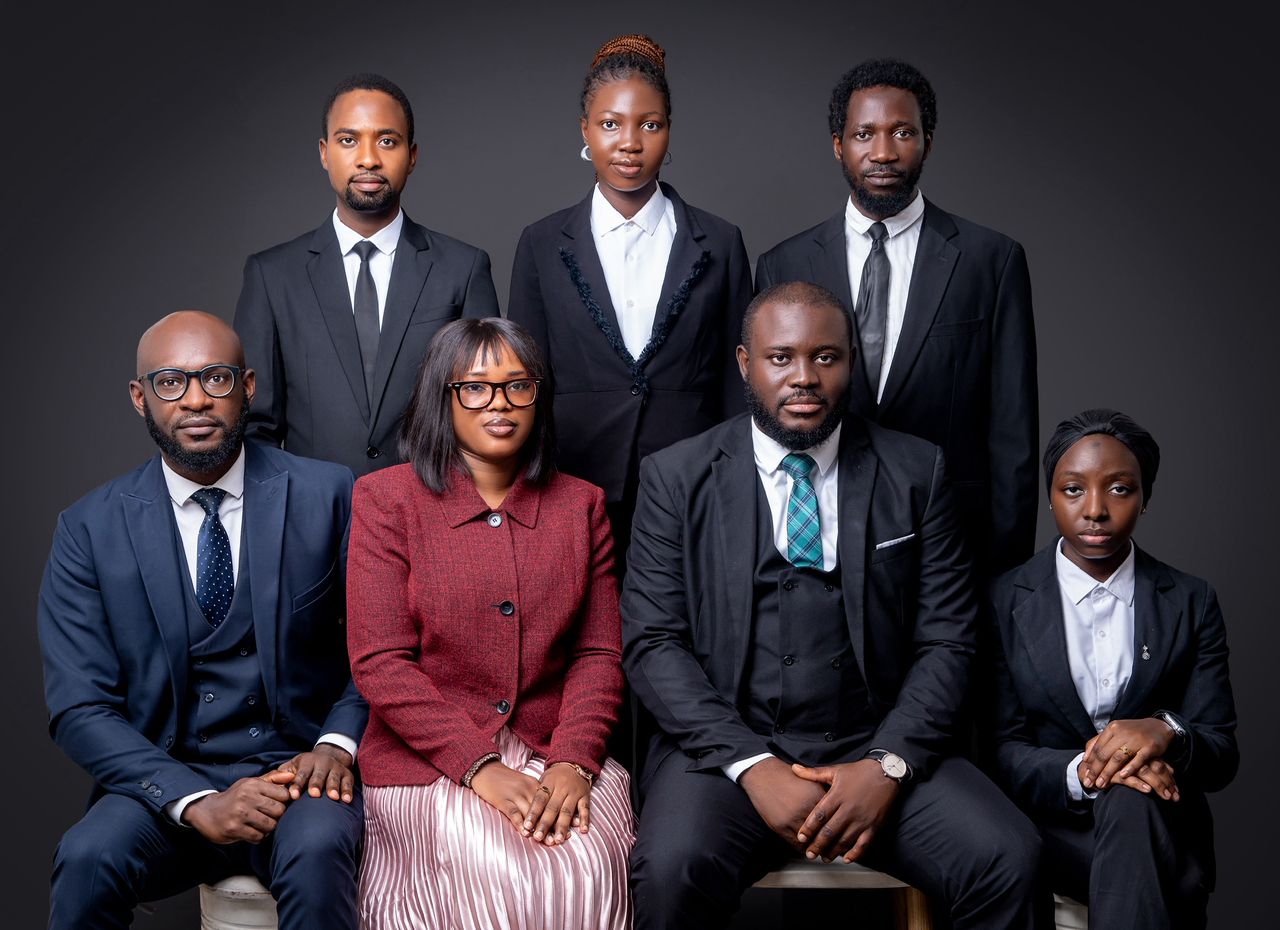Muhammed Adam
Muhammed Adam has been a regular face on X since 2020, where he consistently posted and contributed to political and legal issues online.
Now, he leverages his audience to grow his law firm, Muhammed Adam & Associates (M.A & A), and people seeing his posts have helped bring in clients.

Speaking recently at a students’ union event at the University of Ilorin, where he graduated with a first class in law, he struck as someone deeply passionate about his work.
His story as a corporate and commercial disputes attorney in the business of legal services has to be told.
Advertisement
During the panel session, he advised participants not to include “Barrister” as a title before the name of a legal practitioner — just like on X, where he would teach about law all day long, correcting what he deemed as errors.
In an interview with TheCable, he reflected on his 10-year journey as a lawyer, wondering aloud about the period he decided to leave his lucrative job at a top Nigerian law firm to establish his own practice.
“I started my law firm at the point I felt I was saturated. I was working with top law firms altogether for, say, nine years, and I began finding many things routine,” he recounted.
Advertisement
“I was doing the same thing all over, working for the same set of clients, and attending to almost the same people for years. So, I felt I needed something more challenging.
“Going to another law firm was not an option for me. The option was to start my own law firm, too. Even though it was something I really wanted to have as well, I had gathered enough experience working with different law firms. I felt it was time for me to do it, so I gave it a go.”

Adam said the move was more about a growth mindset, as he earned comfortably well working in the arguably biggest law firm in Nigeria.
What started as posting consistently on social media and commenting on legal and political issues eventually brought him clients, as he built a network online.
Advertisement
His success via social media, according to him, was built before he branched out. He already had a presence where people were consulting him for all sorts of matters.
Then he continued, saying that initially, people assumed he would be too busy for personal connections due to his workplace, despite many wanting to engage with him on a personal level.
Adam noted that branching out on his own made him more accessible. His large following, coupled with his discussions on various legal, political, family, and property issues, made it easier for people to reach out and consider him for legal matters.
Even while working at a top law firm, Adam received client inquiries, which he would refer to other colleagues due to his contractual restrictions, earning a referral fee in the process.
Advertisement
The arrangement allowed him to still benefit financially while adhering to his contract’s non-compete clause.
“Whenever I had any side gig or side briefs, what I would do was to look for a colleague who was less busy or less occupied to give them the briefs to handle, while I supervised and reviewed to ensure that it met the client’s expectations. Sometimes, they go to court on my behalf, and that helped really well,” Adam recounted.
Advertisement
MASTERING LAW PRICING AS A NEWBIE
On pricing structure as a startup law firm owner, Adam had opportunities to know how the law firms he worked with charged clients through meetings, but despite learning, it was still a challenge when he started his own firm.
“I was coming from a top law firm. So, when I want to charge people, I have to breach that standard. But, you know, it was quite challenging for me. Before you know it, people would say I can’t afford you,” he explained.
Advertisement
Adam would reach out to a mentor for guidance, having previously sought advice from partners in big law firms, including those where he had worked, to learn more about pricing.
“One of them told me that because you are just starting, you can’t operate on that tier one level, because people will see you as a small law firm owner and all of that,” he said.
Advertisement
“You have to take it slow. Something that a big law firm will probably charge 5 million for, you can consider 1.5 million. Build a relationship first. And to be honest, it has really worked for me.
“There’s a template on legal services that we designed, which has been professionally designed for lawyers. For property transactions, for instance, we have 10 per cent.
“There are some that are percentage-based, some you just have to use your discretion to look at the complexity of the matter. Consultation, for instance, I have a standard fee for it.”
The attorney emphasised that building strong relationships with clients is crucial, noting that “having good relationships with clients helps a lot”.
THE POWER OF RELATIONSHIPS IN LAW
Adam noted that for startup law firms, you have to build good relationships with people, as he did both as an undergraduate and later through social media, which helped build his clientele.
“They need to have relationships, too,” he said, citing the importance of client connections.
“A good example is that there was a particular client that I met on social media, and he said, ‘I’ll give you a job’. To be honest with you, the number of jobs the client has given me is not up to three, but this client had invited me to his house, and I met someone there who has engaged me as a lawyer as well. That particular person is now one of my highest-paying clients.
“The point is, assuming the other person who was not giving me jobs per se and because of that didn’t create a good relationship with him, there’s no way I would have met another client through him. So, referral has been helping a whole lot in terms of building the client’s base.”
CONSULTATIONS WORTH PAYING FOR
Adam believes young lawyers should rethink the practice of offering free consultations, arguing that these sessions are valuable opportunities to showcase expertise and set the stage for paid work.
Consultation, the attorney said, is an important aspect of law and something legal practitioners should take seriously to ensure their time and expertise are fairly compensated.
“A lot of people take it for granted. For a fact, if you are a very serious lawyer, and able to build trust in the mind of the people, without having a law firm, consultation is something that you can make a lot of money from,” he said.
Making a very strong point, Adam said if lawyers who complain about poor employment opportunities charged consultation fees, they would earn well.
“I can’t just walk into a private hospital and say, ‘Doctor, please, I have a headache, what should I do?’ You can’t walk into a pharmacy and say, ‘Please, I have a headache, what should I go and buy?’ So, that consultation part of it is very, very, very, very important,” he noted.
TAPPING INTO LITIGATION SUPPORT FOR EXTRA EARNINGS
Another part of law that people often overlook is litigation support, according to Adam.
The attorney noted that litigation is the aspect of law many young lawyers are most exposed to, and it’s an area that can bring in significant earnings.
Litigation support, he said, involves a second lawyer providing oversight to ensure the primary lawyer’s strategy aligns with the client’s best interests. It offers a valuable opportunity for lawyers to earn more.
“So, litigation support is where someone, let’s say you’re a client, engages a lawyer to represent you in court, and then engages another lawyer to serve as a watchdog, not to monitor the primary lawyer, but to ensure the strategy they’re adopting is in your best interest,” Adam explained.
“The second lawyer in litigation support does not appear in court for you. The second lawyer reviews the strategies, looks at what the lawyer going to court is doing, and advises on what is good. These are some of the things I do in order to go to court without having to leave my office for another client. I think it’s something that young lawyers can leverage on.”
Aside from writing and communication skills, he re-emphasised that networking skills and social interaction are crucial for lawyers. These enable professionals to engage with people, build relationships, and showcase their expertise. Ultimately, they help to establish a strong reputation.
“How are you a lawyer on WhatsApp, for instance? And at least 10 people who have your contacts are not your clients?” the lawyer asked.
“It is just very important that you are able to communicate with people, and you check up on people. As unimportant as you think it might be, it goes a long way for some people who will say, I have a lawyer who is always checking up on me, give him this brief.”
Even while Adam currently pursues a master’s degree in law at the University of Lagos, he doesn’t believe certification is everything needed to make money as a lawyer.
“Certification is not what brings people money or immediate peace in the profession,” he said.
“It is good to pursue a certificate and go for training, but some have their own limits in terms of clients’ management, clients’ retention and getting clients.”
‘PEOPLE OWING ME LEGAL FEES ARE MY BIGGEST CHALLENGE’
Adam revealed that his most significant challenge as a lawyer stems from clients who refuse to settle their legal fees.
“Getting people to pay your fees on time is the number one challenge,” he lamented.
“If all the clients that owe me pay me today, I think I’ll be able to sort salaries for the next three years.
“Currently, we have 10 staff. Staff members are working on things regularly, and in their minds, they’ll think the clients are paying.
“We’re trying our best to pay. For a small law firm, we are doing our best. However, getting clients to pay you can be quite challenging.”
Another thing that he thinks is affecting both small and top law firms is the ‘JAPA’ syndrome, as talented individuals want to relocate.
“In fact, there’s a particular lady in my office who relocated, and because she used to communicate regularly with the clients, the clients were saying, ‘Where is this person?’ I had to open up and say, this person is no longer here,” he said.
In an effort to mitigate the current economic situation of the country on his staff, the firm adopted a hybrid work arrangement, requiring staff to come to the office on Mondays, Wednesdays, and Fridays, while allowing flexibility to work from home on other days.
Adam reminisced on how his journey as a lawyer was kick-started by his university mates from different departments and classes, who became his first clients. This proves that relationships built early on can lead to unexpected opportunities.
The attorney advised young lawyers to cast their nets wide and nurture connections beyond their immediate circles, a lesson he learnt from his own experience.







